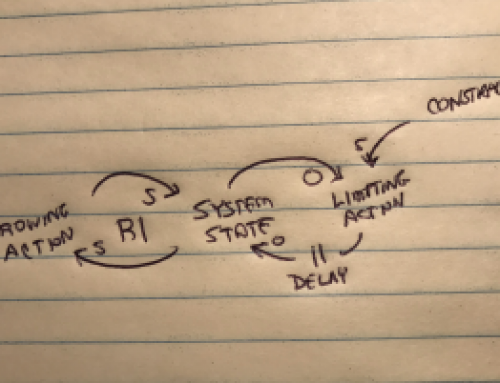In every conversation, whether between two individuals or in a group setting, there are the words that are spoken and those words shape the thinking of all involved and ultimate the decisions that and individual or the group makes. However, there are also many unspoken words during that conversation that perhaps have even more power to shape decisions. These words may add great value to an idea or perhaps reflect an attitude or condition which may, in reality, derail a decision or certainly represent unknown resistance. You have probably experienced this yourself in a conversation when you think things like “we should really try xxxxx,” “this can never work,” “they can’t see the real issue,” or “why do they think this?” In this third article in the series addressing how you can raise your competitive thinking IQ I want to discuss how giving voice to previously unspoken thoughts can raise the bar in terms of thinking competitively and promoting true innovation (see sidebar below for links to the previously published articles in this series).
Why Are Their Unspoken Words?
Why are things left unsaid? Everyone has certainly been in a meeting where you feel like the person leading the meeting doesn’t want to get derailed with other ideas. That’s one reason that might prevent you from speaking up. Other include things like worrying you will look foolish or uninformed, feeling like your thoughts challenge the status quo a bit too much or might create confrontation, or holding on to words because you know they are personal opinions of others or situations that should not be voiced. We all know that we bring certain bias, predispositions, and mental models (my last article) to conversations or meetings. Maybe you walk into a meeting with someone believing that they are not qualified for their position or that they do not see all the facts regarding an upcoming discussion. You may begin a meeting believing that you already know what the outcome should be. You may be starting from a position where you have many questions that you want answered. You may simply have your own personal view of the situation and many past experiences that shape your thinking. Any and all of these things can affect the way you think during a conversation. The point is that everyone has these thoughts and reasons not to share, but at the same time many of these thoughts may greatly improve the overall thinking of the group or prevent future issues and results if a safe environment for sharing can be created and participants can start sharing these thoughts.
Creating a Safe Environment for the Unspoken
A key step in giving voice to unspoken concerns or thoughts is creating a safe environment where all participants agree that it is not only helpful to do this, but also agree that encouraging the voicing of unspoken thoughts is helpful to ensure that ideas are tested and challenged and every voice is heard. This may or may not be easy depending on your culture. If you are a leader, you can easily create such an environment by encouraging people to speak their minds, ask questions and encourage participation, and demonstrate a welcoming demeanor to all thinking, even thinking that may challenge your own views. If you are a participant in meetings and you want to cultivate this kind of open interaction, you may have to lead by demonstrating your own willingness to share unspoken ideas, but perhaps tactfully introduce this thinking in the form of questions to others. If you are thinking “this won’t work … why don’t they see this?”, you might ask questions like “How confident are you in this plan of action and can you help me understand why you are confident in this decision?” This may open a discussion on the topic where you can share ideas that may help challenge the current thinking. You might even feel comfortable sharing that you are struggling to bring up something you were thinking, but that you wanted to do this and encourage others to also express additional thoughts they may have been holding back. In other words, try to model a more open dialogue with the group and see if they group will learn to be more open.
Giving those words a Voice
If you have a safe environment, then the next step is learning how to more consistently give voice to the unspoken thoughts. I would suggest the following exercise that you might employ in your next meeting (likely one that you are leading). Before the meeting begins, ask everyone to take out a sheet of paper and draw a line down the middle. Ask them to take notes about what is being said in the meeting on one side of the paper, basically, just recording the highlights of what is being said. Ask them to use the other side of the paper to write down thoughts they might be having during the meeting that go unsaid. The goal is that by the end of the meeting, their paper would have two parallel streams going – one side having the actual highlights of the conversation and the other side having parallel thoughts they may have been having during various moments of that conversation. The final step is to ask people to openly share some of the thoughts they wrote down that were previously unspoken. In fact, share some of your own unspoken thoughts first. The point of the exercise is to actively welcome these unspoken thoughts and discuss them in a positive open dialogue. Once you use this exercise a few times, you will likely notice the “left unsaid” list gets much smaller and you are engaging in more meaningful discussions during the actual meeting.
The Power of Voicing the Unspoken
For those willing to work to tap into unspoken words, I am willing to say that you will find this well worth the effort and also discover that you and your team will engage in more productive and innovative discussions. You will likely learn some interesting things about the way people think, uncover some unresolved issues that need immediate attention, find surprises in what various people might have to offer, discover how group thinking can move with momentum at times without stopping to be critical of group thought, and certainly learn that open, honest, and more unfettered dialogue produces much needed thinking in terms of challenging ideas and constructive tension. Yes, there is always the potential for misfires where individuals misuse this privilege to rant or complain, but with strong coaching and modeling of the right types of discussion, the positives of sharing things previously left “unsaid” outweigh the risks.

